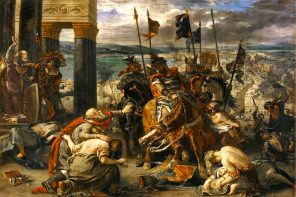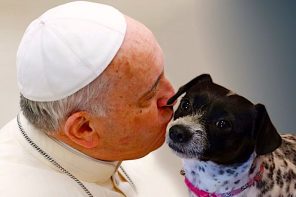Read all the posts in this series here. Doctor Who airs in the U.S. on BBC America on Saturdays at 9PM/8C (and though it’s by no means necessary, those interested in watching the first four seasons can find them streaming on Netflix) — ed.
Joseph Laycock_______________
This latest Doctor Who episode contains several elements for vampire aficionados. The vampire aristocrat Rosana Calvierri is apparently based on Elizabeth Bathory, the historical “blood countess” of Hungary, who would have been twenty years old in 1580 when the episode is set. Bathory was accused of murdering young women and bathing in their blood, just as Calvierri preyed on the daughters of Venice. Calvierri even wears an Elizabethan reticula collar, consistent with many depictions of Bathory. The Doctor also explains that Venice was a favorite city of Lord Byron. Byron’s writings formed the basis of the The Vampire (1819), widely regarded as the first modern vampire story.
As an antagonist, two aspects of the vampire archetype are especially pertinent to the themes of Doctor Who. The Doctor has long protected the earth from alien invaders. However, I would argue that the hostile extra-terrestrials of science fiction are indebted to an older invader—the vampire. Dracula (1897), in particular, drew on vampire lore to describe an interloper from Eastern Europe who comes to prey upon Victorian Londoners. Interestingly, War of the Worlds (1898), the first alien invasion narrative, was published one year after Dracula. But the vampire does not just invade our world; it walks among us to invade our bodies, our autonomy, and our very identities. The loss of identity is a perennial threat in Doctor Who that is reinforced symbolically by several antagonists, notably the Weeping Angels.
However, “Vampires of Venice” also plays on a more recent trend in vampire fiction: a de-sacralized vampire that can be pitied. The first writer to re-imagine the vampire as a biological phenomenon rather than a supernatural one was Richard Matheson in I Am Legend (1954). Two things happen with this shift: First, the cross has become increasingly ineffective as a deterrent against vampires. (Amy chides her fiancé for even attempting this). Second, if vampires feed to survive rather than out of demonic malice, this raises a question of whether we are right in destroying them. As Mattheson’s protagonist mused to himself, “Why cannot the vampire live where he chooses? . . . Why do you wish him destroyed? Ah see, you have turned a poor guileless innocent into a haunted animal.” Despite their hideous appearance, the Saturnynians are pitiable. The Doctor explains that Venice was founded by refugees fleeing Attila the Hun. But the Saturnynians are also refugees whose planet has been destroyed. They do what they do in order to survive. Because of this insight, the Doctor is not a classic vampire slayer, so much as an ecologist. He stops the Saturnynians for the same reason that environmentalists in North America combat the snakehead fish.
Finally, it is fitting that Calvierri offers an alliance with the Doctor. Like the vampire, the Doctor is also an immortal outsider walking among us. He too has unnatural abilities and is alluring to the opposite sex. The vampire then is the shadow of the Doctor—a theme that will be explored further in the next episode.
James F. McGrath_______________
Vampires vs. Aliens, Magic vs. Science
One of the topics that I discussed in my religion and science fiction class last semester was the relationship between sci-fi and fantasy. Some are fans of both, and some prefer one or the other. But how clear is the distinction? The Doctor Who episode “Vampires of Venice” provides a good illustration of what distinguishes them—and of what makes the distinction blurry.
What distinguishes science fiction from fantasy is not a genuine absence of “magic” in sci-fi, but the presence of at least a token acknowledgment of science and a claim that there is a scientific explanation for what is going on. The science does not have to be plausible, however, and so it is only the nod to science, rather than a real scientific basis, that distinguishes the Doctor’s TARDIS which allows him to move around in space and time from the time turner or portkeys in Harry Potter.
This is illustrated well on “Vampires of Venice”—and is also discussed in a recent interview with Steven Moffatt on IO9. Here’s a question Moffatt was asked and his reply:
Do you think the fairy tale aspect is at odds with the science-fiction aspect, where everything has to have a scientific explanation? Or do you think those things go together?
That’s just how you justify it. It’s a mechanism by which you justify what happens. There was magic in fairy tales back when people believed in magic. That’s just the machinery of it. That’s not a problem. There isn’t magic in Doctor Who—there are sometimes [laughs] token scientific explanations for everything, yes. But I mean, you know, he lives in a box that’s bigger on the inside than on the outside. When he regenerates, he turns into somebody with a new hairstyle and sideburns a particular length. Explain that, science! When Doctor Who’s really, really good, there’s a feeling of magic about it. It’s a magical-feeling show. We’ve got a justification for why this time machine looks like a battered old blue box with all the wonderful panels. But the explanation doesn’t matter so much as the aesthetic of it. It makes it feel like a wizard’s box.
For whatever reason, we enjoy stories involving vampires and other scary monsters. And so perhaps the question is why some of us find the story more satisfying if the vampires are really aliens, and the magic deep down is supposedly really science. Arthur C. Clarke famously said, “Any sufficiently advanced technology is indistinguishable from magic.” But that statement is an affirmation of faith—faith that science will one day turn magic into reality, and make the impossible possible.
And so by exploring the relationship between sci-fi and fantasy, aliens and vampires, time lords and wizards, we are given an opportunity to reflect on why even the scientifically-minded in our time often retain a deep-seated desire for the magical, and enjoyment of stories which are, ultimately, full of magic. It also gives us an opportunity to ponder how we may cope if it turns out that science is no more able to accomplish time travel or teleportation than magic is.
Henry Jenkins_______________
What disturbs me about “Vampires of Venice” is the breeziness with which the story passes over a potentially devastating moment. The Doctor has the opportunity to save Isabella and fails to do so. She is later killed, and her father sacrifices himself, presumably having lost the will to live.
It is obvious that the Doctor chooses his commitments carefully. If Amy is inhabited by a Weeping Angel, the Doctor will upend the heavens and the Earth to rescue her, and vow to seek unrelenting vengeance against anyone who does her arm. No, he won’t promise Jackie that Rose will always be safe with him. But the Doctor will act with incredible resourcefulness to keep his companions safe.
The Doctor has had 37 companions, not counting animation or radio dramas, counting the Romanas and K-9s as one being each, and including only characters who appeared in multiple serials or episodes. 35 lived—94%.
As a side note, the only two companions to ever die both did so in acts of heroism and self-sacrifice. In “The Daleks’ Master Plan” (1965-1966), Katarina dooms herself to die in space in order to take her captor down with her. In “Earthshock” (1982), Adric does not die on purpose, but fails to hack a computer system that would have saved his life. Nonetheless, he took on the challenge knowing the risks involved.
By comparison, other humans die in almost every Doctor Who episode, often with little emotional payoff. “Vampires of Venice” is just the most recent and exceptionally brazen example. We do not see the Doctor apologize to Guido for letting Isabella slip through his fingers when he had the chance to save her. Guido’s own death in an explosion only seems to trouble him momentarily.
In reality, this is a writing and production decision. Isabella and Guido’s deaths serve useful plot functions, but dealing with the consequences of their loss would darken the tone of this rollicking historical adventure, and bring the lightning fast pace to a near standstill.
One could question whether the writers are defeating themselves by establishing Isabella, from the opening scene, as a point of audience identification, and then failing to reap the fruit of that success. But presumably writer Toby Whithouse and director Jonny Campbell felt the deaths would have an impact without any further commentary from the Doctor.
For the purposes of the story, perhaps the Doctor’s lack of a reaction could be read in terms of Rory’s far-more piercing criticism in the castle. The Doctor inspires his companions to do stupid, dangerous things to prove themselves for him.
Perhaps what Rory isn’t giving the Doctor credit for is his willingness to do stupid, dangerous things to protect his companions. Perhaps he cannot reasonably be asked to take the same risks for every red-shirted bit player he meets. Otherwise he could burn through all of his lives in short order, and save the universe far fewer times.
Alternatively, perhaps the companions’ relatively excellent chance of survival is part of the reason he chooses them. He clearly has a knack for choosing exceptional and underappreciated people. Not just every mundane office worker can save the universe with the panache Donna Noble can.
But I’m still left with two troublesome inconsistencies that I cannot resolve within the logic of the story. Why does the Doctor care more about “The Beast Below”’s Star Whale than he does Guido and Isabella? And why don’t Amy and Rory seem more upset?
Gabriel Mckee_______________
Vampires of Venice
James ponders “why some of us find the story more satisfying if the vampires are really aliens, and the magic deep down is supposedly really science”; Joe considers the villains as “de-sacralized vampire[s] that can be pitied.” What’s at stake here is the issue of enchantment vs. disenchantment, and shows one of the responses that science fiction has had to the impact of rationalism on myth. The vampires of this episode aren’t really vampires, in the sense that they aren’t supernatural. They can be explained, they can be described in rational terms, they can be brought under the sway of human reason. But they can’t be said not to exist—they aren’t what we imagined, but there they are nonetheless. The type of rational explanation offered here for vampires, like so many science-fictional explanations of impossible things, ultimately serves to reenchant the concept of the vampire: no, they’re not magic, but they’re real, and here’s how!
This is an old conceit in sci-fi, and (for whatever reason) in television sci-fi in particular. The original Star Trek episode “Who Mourns for Adonais?” offered a reinterpretation of Greek mythology in which the gods were alien beings with incredible powers. Stargate: SG-1 took this a step or two further, resurrecting entire pantheons and reinterrpreting their mythology as the true history of alien invasion. And The X-Files is replete with rational explanations for bizarre phenomena. This kind of rationalism is not content just to debunk and disprove; it finds more joy in making the impossible possible. It does not want to discard myth for science; it wants to re-enchant the scientific world.
And so, as the above-quoted Steven Moffatt interview suggests, science, for Doctor Who, is just fancier kind of magic. Another kind of magic, as Henry suggests, is the ease with which the Doctor and his companions are able to avoid disaster and destruction. Given the sorts of trouble they find themselves in, that 94% survival rate is nothing short of a miracle. But that’s the universe that Doctor Who takes place in: one where the good guys, the side of truth and justice, will always win. That’s another kind of magic, one that seeks to transcend the muddiness of morality in the everyday world—and it can also be seen at the heart of apocalyptic spirituality, which hopes to see our world replaced with a divine one (a replacement that is all too often imagined as violent). In the context of a television show, that desire for the good guys to win is simple escapism: is apocalypticism, then, a sort of theological escapism, “magical thinking” that wants to see human evil eradicated without human effort?
I’ve escaped a bit beyond the bounds of the conversation thus far. But the Doctor is, above all else, a humanist hero, and I think that respect for human capability is a big factor in his choice of companions. But will his companions always choose him? Ah, that’s for next week…




